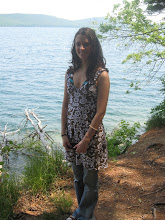I enjoyed reading the creative nonfiction piece "Shooting An Elephant" by George Orwell and it gave me a somewhat different perspective to look at. I read George Orwell before and I think his writing is incredible but this piece is the first I read of Orwell that is creative nonfiction.
This story is nonfiction because it is factual. It takes place in 1931 in Burma and Orwell was working as a white, sub-divisional police officer. He said that he hated his job and he was the one who usually got laughed out. "I was hated by large numbers of people- the only time in my life that I have been important enough for this to happen to me." But the story is, more importantly, creative nonfiction from what a reader is able to gain by reading it.
Like fiction story, I couldn't wait to keep reading to see what was going to happen and how it would end. There was reality all around him in this story but also inside him. Inside him was a conflict, a debate on what to do. His reasoning for killing the elephant was to be looked at differently. The decision was never about the death of the elephant. He wanted to be somebody. "And it was in this moment, as I stood there with the rifle in my hands, that I first grasped the hollowness, the futility of the white man's dominion in the East." And in that instance, he wasn't separated from the native people anymore. He was connected with them by this rifle and he liked the feeling of it. He wasn't afraid of the elephant, he was afraid of being laughed at.
I loved how this story brought up many multiple meanings and insights. The story ended with a sense of dissopointement but unlike the others, I was able to pull out several meanings. It reminded me of the story "Out There" by Jo Ann Beard but left more of an impression of a truthful reality. Even though it was a different time period, the same feelings and emotions still applies today. There was reality around him but this intenseness came from the emotional reality inside him that was portrayed throughout the entire story. To be an individual is not to wear a mask but to be different and stand a part from the crowd. It's about doing something you are truly proud of. If it is just for others, then you prove to be weak. And Orwell knew this and he did it anyway. He knew he was a puppet. "For it is the condition of his rule that he shall spend his life in trying to impress the "natives," and so in every crisis he has got to do what the "natives" expect of him.
I found "That men should not judge of our happiness till after our death" to be a confusing and hard read and once I starting reading it, I wasn't able to gain meaning and relate as well as the other pieces but this is in fact, creative nonfiction. I happened to do a little researching on Michel de Montaigne and came across a website that briefly describes him. I was able to understand the reasoning for his writing with better insight for why this piece is connected to what we have been learning about creative nonfiction. In this biography it says that "He is searching for truth by reflecting on his readings, his travels as well as his experiences both public and private." This writing doesn't appear to be a story but a historical period of time in which he expresses his beliefs and opinions that appear to be significant for him. It seems that a lot of this writing is swaying towards Catholicism and the beliefs of death.
I also like to use what I have learned in the past as well as my experiences in my writing. A lot of it may be opinions, but I ultimately like to write what I think and feel in hope that others may be able to connect and relate to it as well. Inspiration can be absorbed in your life and by what you read from others.
The website I used is
http://oregonstate.edu/instruct/phl302/philosophers/montaigne.html
Subscribe to:
Post Comments (Atom)

No comments:
Post a Comment